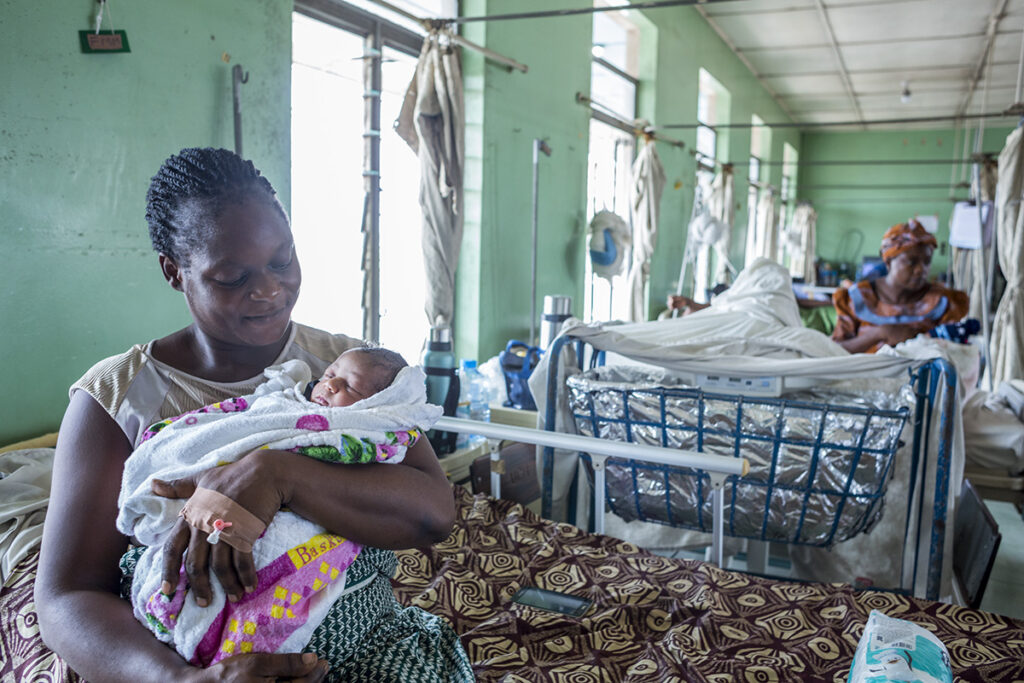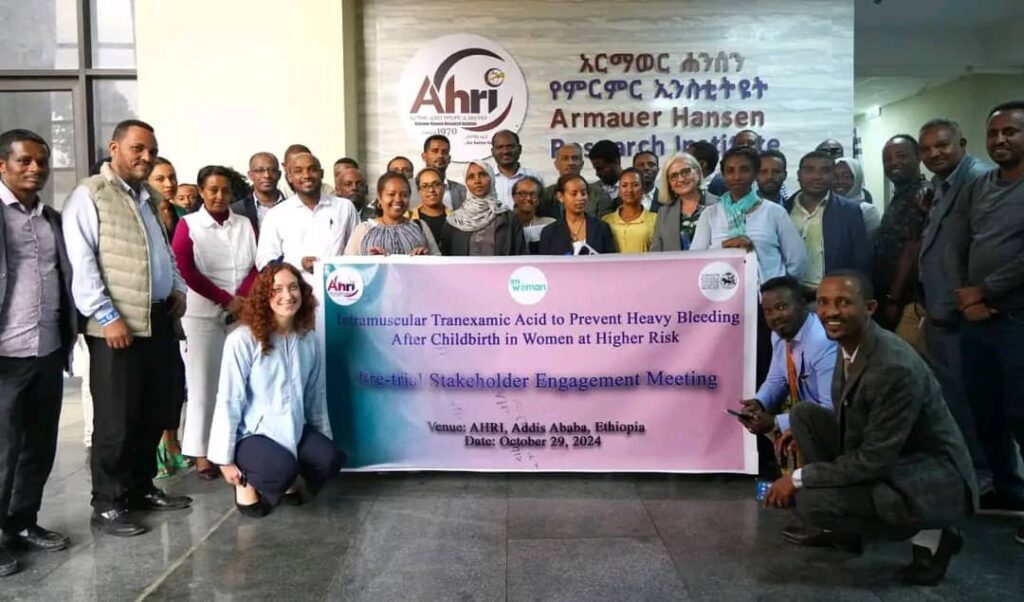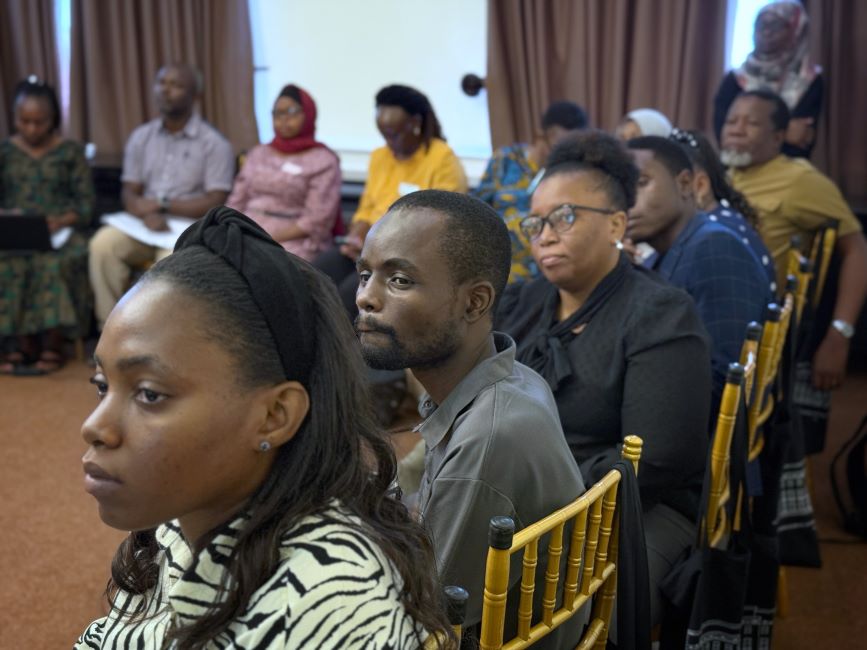2024 has been an extremely busy year for the WOMAN Trials team. From publishing and presenting the WOMAN-2 Trial results, to planning the WOMAN-3 Trial and starting recruitment for the I’M WOMAN Trial, we reflect on some of the key highlights from across the year and look ahead to plans for our trials in 2025.

Publishing the WOMAN-2 Trial results!
On 25 October, the WOMAN Trials collaborators published the WOMAN-2 Trial results and an accompanying individual patient data meta-analysis in The Lancet. These two papers revealed important evidence on the effects of the drug tranexamic acid (TXA) on postpartum haemorrhage (PPH) and life-threatening bleeding after childbirth.
The papers also highlighted the hugely negative impact that moderate and severe anaemia have on pregnant women and their babies and could be significant in making progress towards reducing maternal deaths.
WOMAN-2 Trial results meeting
In July – in the run up to the publication of the trial results – the WOMAN-2 Trial teams from Pakistan, Nigeria, Tanzania and Zambia and London, who have worked tirelessly to make the WOMAN-2 Trial happen over the past few years, met to discuss the trial results, finalise the manuscript and talk about disseminating the results.
Professor Rizwana Chaudhri – National Coordinator for Pakistan, Dr Luzango Evarist Maembe – obstetrician and gynaecologist from Tanzania, and Professor Nike Bello – National Coordinator in Nigeria – shared their initial thoughts and reactions to the results back in July.
The Healthier Together film
This year, BBC StoryWorks followed the work of the WOMAN Trials in Nigeria, documenting the risk of PPH in anaemic women and the progress of the WOMAN-2 Trial.
The film features Professor Nike Bello talking about her research to make childbirth safer. A mother who took part in the WOMAN-2 Trial, Umar, also features and tells her story of experiencing pregnancy and childbirth while anaemic.
We launched the short film on 20 May, Clinical Trials Day, to celebrate the trailblazers working in clinical trials, like Professor Bello, who make advancements for human health and medical breakthroughs possible.
The film “Making childbirth safer for at-risk mother” is part of the Healthier Together series presented by the WHO Foundation and produced by BBC StoryWorks.
Inclusion of women in clinical trials
For International Woman’s Day on 8 March, the WOMAN-2 Trial team reflected on the theme of “Inspire Inclusion” and the fundamental need for equality, diversity and inclusion in clinical trials.
Professor Ian Roberts, Professor of Epidemiology at LSHTM and co-lead of the WOMAN-2 Trial, wrote about why pregnant and breastfeeding women are not included in medical research, the gaps in knowledge this creates and the issues this causes in ensuring they get the right treatment.
Sharing stories from our community
Throughout the year, the WOMAN-2 Trial team has celebrated our predecessors, colleagues and women affected by anaemia and PPH. We spotlighted partners and shared their stories, from those involved in organising the clinical trial, to those affected by PPH. By sharing their stories, we highlighted what we hope to achieve and the need to find solutions to reduce maternal mortality.
- Read Helena’s story: Helena experienced maternal anaemia and reflected on her pregnancy and childbirth, and the importance of feeling informed for an empowered childbirth.
- Find out more about the history and discovery of TXA in our blog looking back on the life of Utako Okamoto, a Japanese medical doctor who discovered this life-saving drug in the 1950s.
- Watch our film which celebrates the life of the late Professor Bukola Fawole. Professor Bukola, who led the WOMAN Trial in Nigeria, presciently recognised the significance of chronic and severe maternal anaemia in Nigeria and its negative impact on PPH and maternal mortality – evidence we now have from the WOMAN-2 Trial.
Championing women’s rights
“My health, my right” was the theme of this year’s World Health Day in April. To mark the day, Professor Ian Roberts highlighted a number of factors which lead to women’s basic human right of access to quality health services not being upheld.
Professor Roberts highlighted exclusion from medical research, anaemia and pain relief as some of these factors and discussed actions required to address this.
The people at the centre of our work
This year, we were reminded of the importance of our work in helping reduce maternal mortality rates when we read the harrowing story, “Pregnancy is not a disease” by Kasia Strek in the Guardian.
The article is a stark reminder of the reality of maternal health and healthcare in Nigeria and the need for urgent action to address issues such as anaemia, PPH, and other contributing factors to the high levels of maternal mortality.
Read our reflections on the article.
The I’M WOMAN Trial celebrates one year of recruitment
In 2024, the trial team celebrated recruiting 7,000 women. The target is to reach 30,000 participants by the end of 2025.
Professor Projestine Muganyizi, National Coordinator in Tanzania, said:
“22 April 2024 was the most unforgettable day for me and the I’M WOMAN Trial team in Tanzania. […] Tanzania has now recruited over 3,400 participants across nine recruiting sites – a true testament to the dedication and progress of our team.”
The team is recruiting eligible women to assess whether giving TXA just before birth and intramuscularly reduces life-threatening bleeding. The trial is exploring this as an alternative route to giving TXA intravenously so women can be treated faster for severe postpartum bleeding.
The I’M WOMAN Trial team established a community-based team to advise their research
This year, the I’M WOMAN Trial team established a community advisory board (CAB) to involve more grassroots organisations and activists in raising awareness about TXA to treat PPH.
The team is excited to be partnering with Women Advocates Research and Documentation Centre (WARDC) on increasing community engagement in Nigeria. WARDC will also engage with the Nigerian federal and state government to advocate for increased TXA supply in hospitals.

I’M WOMAN Trial meeting in Tanzania
The I’M WOMAN Trial team visited several hospital sites in Tanzania to share best practices in obstetrics and gynaecology. During the visit, the WOMAN-2 Trial team also presented their trial results to collaborators, which allowed women and their families to share how severe anaemia had impacted their experiences of childbirth.
From recruiting more eligible women to the trial, to sharing the benefits of early TXA administration, hear from clinicians on the I’M WOMAN Trial team in Tanzania and how they will advocate for using TXA to treat PPH.

Unitaid announce investment in maternal health
We are pleased to see that Unitaid – our funder for the I’M WOMAN Trial – is doubling its investment in maternal and newborn health, with $50M in funding to combat preeclampsia and anemia.
As the WOMAN-2 Trial has shown, anaemia is a public health issue that has a hugely negative impact on pregnant women and their babies, and this increase in funding is a major step in supporting and expanding tools for diagnosis and care.
What’s in store for 2025?
The team is very excited about plans for the New Year and how our work could contribute to the reduction of maternal mortality around the world.
We are working hard to analyse the huge amount of data that was collected as part of the WOMAN-2 Trial. This will result in the publication of several papers on anaemia and PPH, as well as on the topic of who should be given TXA and its cost-effectiveness.
The WOMAN Trials team will continue to raise awareness of the negative impact that anaemia has on mothers and their babies. This will involve advocating for the global health community to do more to prevent and treat anaemia and sharing women’s stories who have been affected by anaemia, PPH, stillbirth and traumatic births.
Recruitment to the I’M WOMAN Trial will continue in our participating countries, and 2025 will see the start the WOMAN-3 Trial, which will examine the role of giving TXA during menstruation alongside the usual iron and multivitamins to treat anaemia. This work will hopefully improve access to TXA and anaemia prevention.